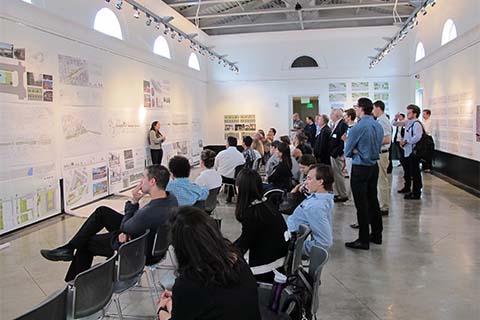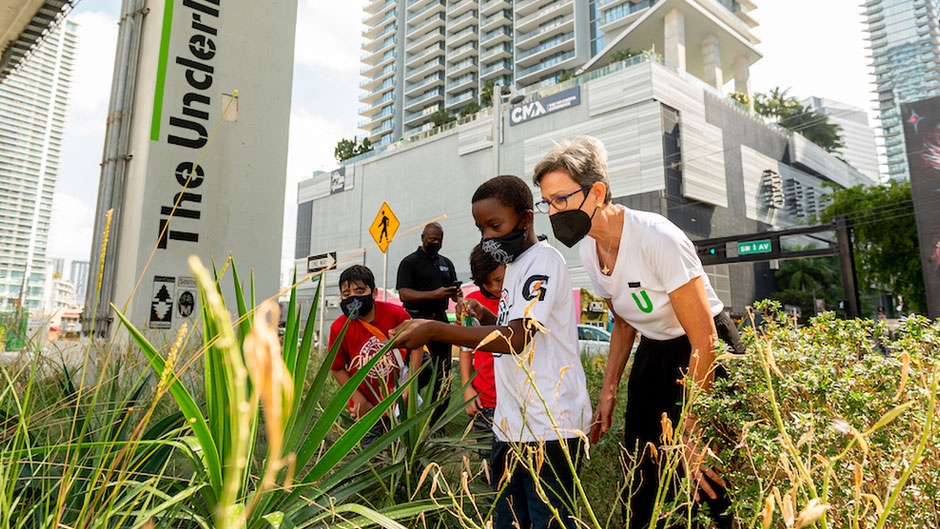In a talk on Thursday during the Herbert Half Hour lecture series, Meg Daly, founder and president of The Underline, shared her experience in launching an entrepreneurial startup, managing a nonprofit organization that coordinates $140 million in construction funding, and overseeing a project that will ultimately bring a wealth of well-being to the University of Miami’s doorstep.
“We look forward to being a middle-aged company someday soon, but we’re still an entrepreneurial startup which means we’re scrappy, opportunistic, and juggling a lot of balls at the same time,” said Daly, in a noonday talk with Dean John Quelch of the Miami Herbert Business School. “You have to be always looking for that next opportunity and be open to having others help you—don’t think that you have all the answers.”
In three construction phases, The Underline converts a 10-mile stretch of unused land running under the Metrorail into a hybrid of community space—park, trail, art destination, sound stage, and more. Phase 1 or Brickell Backyard, the first half-mile of the project, was finished on Feb. 26. Phase 2, a 2.14-mile stretch from SW 13th Street to SW 19th Avenue, begins construction Aug. 30. And Phase 3, a 7-mile stretch that extends southward to Dadeland South Metrorail Station, is to be completed by 2026.
The University of Miami is one of the largest landowners that fronts The Underline and one of the many communities that will benefit from the conversion, Daly noted.

She credited the University for its help with the project—through meetings and visioning studies held with support from the School of Architecture—and also with leadership. Both Rudy Fernandez, senior vice president for public affairs and communication and chief of staff to the president, and most recently Donna Shalala, former congresswoman and former University president, serve on The Underline’s board of directors.
Daly explained how she came to launch the project in 2013. She had broken both her arms, couldn’t drive, had tired of asking friends to ferry her around, and she decided to walk home from physical therapy one afternoon—under the Metrorail. The shade, light breeze, and swaths of dormant land conspired to create an epiphanic moment.
Daly first shared her idea for the project with her father, a renowned area philanthropist. Heartily enthusiastic, he even offered to work with her. Then she turned to friends for advice.
“When 90 percent of the people are telling you it’s a great idea, then there’s something there and reason to move ahead,” Daly said.
Her professional background in marketing has proved essential to both managing an organization and securing partner support.
“Communication is so important,” she said. “A lot of people don’t know the importance of an elevator pitch or how to pivot that pitch depending on who they’re talking with. You really have to know who your audience is for your message to resonate.”
The pandemic punctuated the value the project provides to community well-being, she said.
“COVID endorsed the need for outdoor economy and the importance of vibrant public spaces,” she said. “People dusted off their bikes, discovered they can walk and bike with their families, the elderly saw the need to be able to be out in the community and for connecting with other neighborhoods.”
Daly apologized in advance for disruptions that future construction will cause, and she emphasized that safety is a priority of the project. Because road crossings are the most vulnerable areas, widening the crossings, bright-colored paint, extending crossing times are all considerations to safeguard pedestrians, she explained, albeit without overly inconveniencing drivers.
Because there is no direct funding source for industrial reuse projects, Daly described the “funding lasagna” that supports the project: $23 million in federal grants; $80 million in county road impact fees; $15 million from City of Miami; $7 million from the City of Coral Gables; and $15 million from the state of Florida from certain appropriations. Miami-Dade County oversees the public-private partnership that includes the Department of Transportation and Public Works; the Parks, Recreation and Open Spaces Department, and Friends of The Underline.
She noted that studies have indicated that the conversion to community friendly green space will result in significant real estate value appreciation—which is estimated to generate some $50 million annually in new tax receipts—yet the project’s ultimate goal of building a better city resists financial assessment.
“How do you quantify better community, building a better city and making it more livable?” Daly asked.
While construction continues, supervising the nonprofit requires the same leadership and vigilance as for any company, especially one utilizing taxpayer dollars. Looking ahead, Daly recognized the challenge of maintaining programming for the 10-mile stretch of the 24/7 transportation portal.
For those interested, Daly highlighted that a range of volunteer opportunities exist to support the ongoing project and its wide range of health and wellness programming activities. Visit TheUnderline.org.

